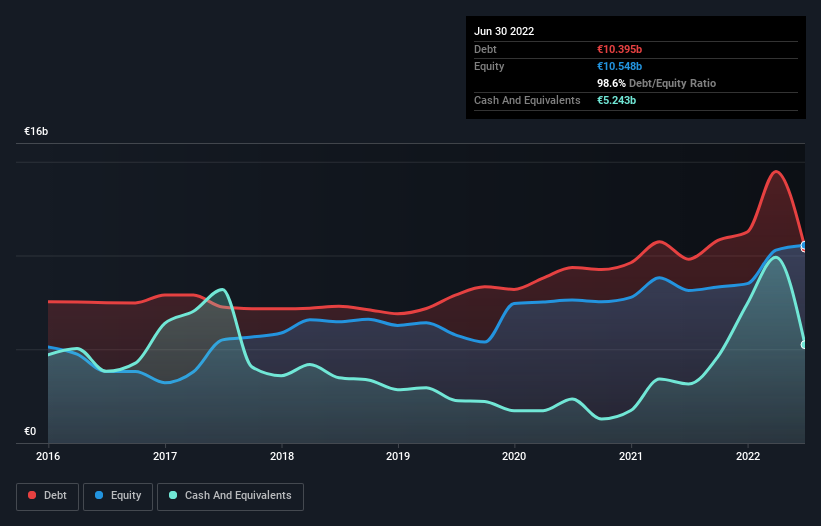
Some say volatility, rather than debt, is the best way to think about risk as an investor, but Warren Buffett famously said that 'Volatility is far from synonymous with risk.' When we think about how risky a company is, we always like to look at its use of debt, since debt overload can lead to ruin. We note that EnBW Energie Baden-Württemberg AG (ETR:EBK) does have debt on its balance sheet. But is this debt a concern to shareholders?
When Is Debt A Problem?
Debt assists a business until the business has trouble paying it off, either with new capital or with free cash flow. If things get really bad, the lenders can take control of the business. However, a more common (but still painful) scenario is that it has to raise new equity capital at a low price, thus permanently diluting shareholders. Of course, debt can be an important tool in businesses, particularly capital heavy businesses. The first step when considering a company's debt levels is to consider its cash and debt together.
See our latest analysis for EnBW Energie Baden-Württemberg
What Is EnBW Energie Baden-Württemberg's Net Debt?
As you can see below, at the end of June 2022, EnBW Energie Baden-Württemberg had €10.4b of debt, up from €9.81b a year ago. Click the image for more detail. However, because it has a cash reserve of €5.24b, its net debt is less, at about €5.15b.

How Healthy Is EnBW Energie Baden-Württemberg's Balance Sheet?
We can see from the most recent balance sheet that EnBW Energie Baden-Württemberg had liabilities of €34.7b falling due within a year, and liabilities of €25.5b due beyond that. On the other hand, it had cash of €5.24b and €6.36b worth of receivables due within a year. So its liabilities total €48.6b more than the combination of its cash and short-term receivables.
This deficit casts a shadow over the €22.9b company, like a colossus towering over mere mortals. So we definitely think shareholders need to watch this one closely. After all, EnBW Energie Baden-Württemberg would likely require a major re-capitalisation if it had to pay its creditors today.
In order to size up a company's debt relative to its earnings, we calculate its net debt divided by its earnings before interest, tax, depreciation, and amortization (EBITDA) and its earnings before interest and tax (EBIT) divided by its interest expense (its interest cover). This way, we consider both the absolute quantum of the debt, as well as the interest rates paid on it.
EnBW Energie Baden-Württemberg's net debt to EBITDA ratio of about 1.9 suggests only moderate use of debt. And its strong interest cover of 762 times, makes us even more comfortable. It is well worth noting that EnBW Energie Baden-Württemberg's EBIT shot up like bamboo after rain, gaining 55% in the last twelve months. That'll make it easier to manage its debt. When analysing debt levels, the balance sheet is the obvious place to start. But you can't view debt in total isolation; since EnBW Energie Baden-Württemberg will need earnings to service that debt. So when considering debt, it's definitely worth looking at the earnings trend. Click here for an interactive snapshot.
Finally, a company can only pay off debt with cold hard cash, not accounting profits. So we always check how much of that EBIT is translated into free cash flow. Happily for any shareholders, EnBW Energie Baden-Württemberg actually produced more free cash flow than EBIT over the last three years. That sort of strong cash generation warms our hearts like a puppy in a bumblebee suit.
Our View
Based on what we've seen EnBW Energie Baden-Württemberg is not finding it easy, given its level of total liabilities, but the other factors we considered give us cause to be optimistic. There's no doubt that its ability to to cover its interest expense with its EBIT is pretty flash. It's also worth noting that EnBW Energie Baden-Württemberg is in the Electric Utilities industry, which is often considered to be quite defensive. Considering this range of data points, we think EnBW Energie Baden-Württemberg is in a good position to manage its debt levels. But a word of caution: we think debt levels are high enough to justify ongoing monitoring. There's no doubt that we learn most about debt from the balance sheet. However, not all investment risk resides within the balance sheet - far from it. For example EnBW Energie Baden-Württemberg has 3 warning signs (and 1 which is a bit concerning) we think you should know about.
If, after all that, you're more interested in a fast growing company with a rock-solid balance sheet, then check out our list of net cash growth stocks without delay.
Valuation is complex, but we're here to simplify it.
Discover if EnBW Energie Baden-Württemberg might be undervalued or overvalued with our detailed analysis, featuring fair value estimates, potential risks, dividends, insider trades, and its financial condition.
Access Free AnalysisHave feedback on this article? Concerned about the content? Get in touch with us directly. Alternatively, email editorial-team (at) simplywallst.com.
This article by Simply Wall St is general in nature. We provide commentary based on historical data and analyst forecasts only using an unbiased methodology and our articles are not intended to be financial advice. It does not constitute a recommendation to buy or sell any stock, and does not take account of your objectives, or your financial situation. We aim to bring you long-term focused analysis driven by fundamental data. Note that our analysis may not factor in the latest price-sensitive company announcements or qualitative material. Simply Wall St has no position in any stocks mentioned.
About XTRA:EBK
EnBW Energie Baden-Württemberg
Operates as an integrated energy company in Germany, rest of Europe, and internationally.
Excellent balance sheet second-rate dividend payer.


